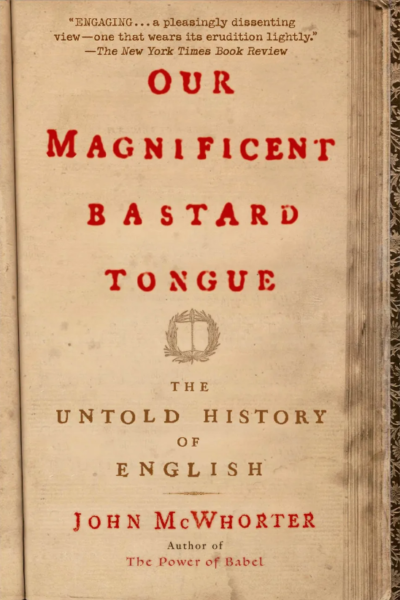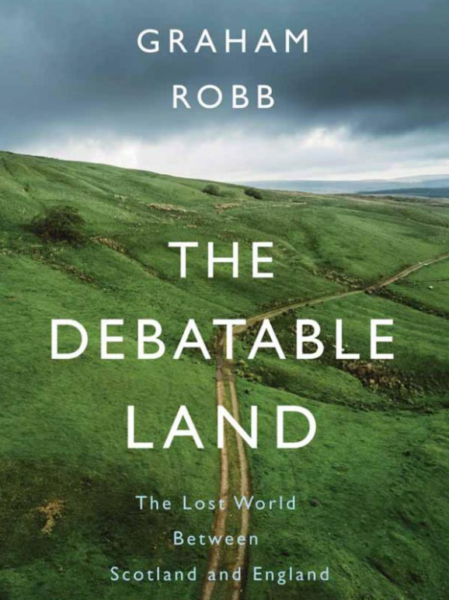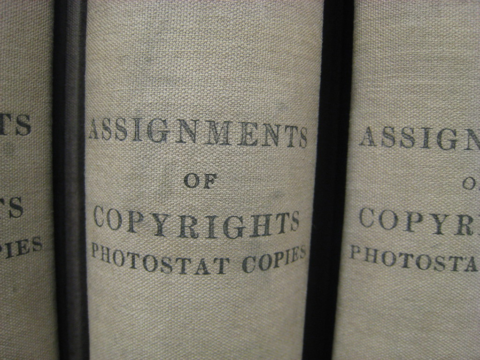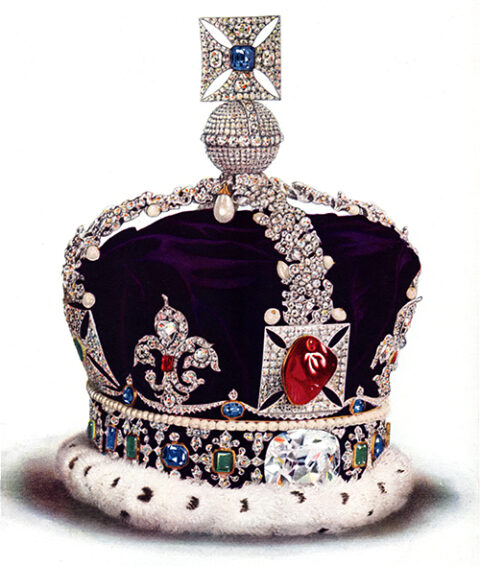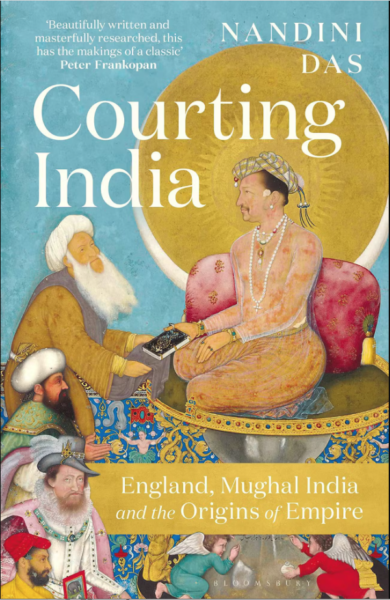The latest book review from Mr. and Mrs. Psmith’s Bookshelf is John McWhorter’s Our Magnificent Bastard Tongue: The Untold History of English. I’m afraid I often find myself feeling cut adrift in discussions of the evolution of languages, as if I’m floating out of control in a maelstrom of what was, what is, and what might be, linguistically speaking. It’s an uncomfortable feeling and in retrospect explains why I did so poorly in formal grammar classes. When Jane Psmith gets around to discussing actual historical dates, I find my metaphorical feet again:
Shakespeare wrote about five hundred years ago, and even aside from the frequency of meaningless “do” in normal sentences, it’s clear that our language has changed since his day. But it hasn’t changed that much. Much less, for example, than English changed between Beowulf (probably written in the 890s AD)1 and The Canterbury Tales (completed by 1400), another five hundred year gap. Just compare this:
Hwæt. We Gardena in geardagum, þeodcyninga, þrym gefrunon, hu ða æþelingas ellen fremedon.2
to this:
Whan that Aprille with his shoures soote,
The droghte of March hath perced to the roote,
And bathed every veyne in swich licóur
Of which vertú engendred is the flour…3That’s a huge change! That’s way more than some extraneous verbs, the loss of a second person singular pronoun (thou knowest what I’m talking about), or a shift in some words’ definition.4 That’s practically unrecognizable! Why did English change so much between Beowulf and Chaucer, and so little between Shakespeare and me?
There’s a two part answer to this, and I’ll get to the real one in a minute (the changes between Old English and Middle English really are very interesting), but actually I must first confess that it was a trick question, because my dates are way off: even if people wrote lovely, fancy, highly-inflected Old English in the late 9th century, there’s no real reason to think that’s how they spoke.
On one level we know this must be true: after all, there were four dialects of Old English (Northumbrian, Mercian, Kentish, and West Saxon) and almost all our written sources are in West Saxon, even the ones from regions where that can’t have been the lingua franca.5 But it goes well beyond that: in societies where literacy is not widespread, written language tends to be highly conservative, formal, and ritualized. Take, for example, the pre-Reformation West, where all educated people used Latin for elite pursuits like philosophical disputatio or composing treatises on political theory but spoke French or Italian or German or English in their daily lives. It wasn’t quite Cicero’s Latin (though really whose is), but it was intentionally constructed so that it could have been intelligible to a Roman. Similarly, until quite recently Sanskrit was the written language of India even though it hadn’t been spoken for centuries. This happens in more modern and broadly literate societies as well: before the 1976 linguistic reforms, Greeks were deeply divided over “the language question” of whether to use the vernacular (dimotiki) or the elevated literary language (Katharevousa).6 And modern Arabic-speaking countries have an especially dramatic case of this: the written language is kept as close to the language of the Quran as possible, but the spoken language has diverged to the point that Moroccan Arabic and Saudi Arabic are mutually unintelligible.
Linguists call this phenomenon “diglossia”. It can seem counter-intuitive to English speakers, because we’ve had an unusually long tradition of literature in the vernacular, but even for those of us who use only “standard” English there are still notable differences between the way we speak and the way we write: McWhorter points out, for example, that if all you had was the corpus of Time magazine, you would never know people say “whole nother”. Obviously the situation is far more pronounced for people who speak non-standard dialects, whether AAVE or Hawaiian Pidgin (actually a creole) or Cajun English. (Even a hundred years ago, the English-speaking world had many more local dialects than it does today, so the experience of diglossia would have been far more widespread.)7
Anyway, McWhorter suggests that Old English seems to have changed very little because all we have is the writing, and the way you wrote wasn’t supposed to change. That’s why it’s so hard to date Beowulf from linguistic features: the written language of 600 is very similar to the written language of 1000! But despite all those centuries that the written language remained the perfectly normal Germanic language the Anglo-Saxons had brought to Britain, the spoken language was changing behind the scenes. As an increasing number of wealhs adopted it (because we now have the aDNA proof that the Anglo-Saxons didn’t displace the Celts), English gradually accumulated all sorts of Celtic-style “do” and “-ing” … which, obviously, no one would bother writing down, any more than the New York Times would publish an article written the way a TikTok rapper talks.
And then the Normans showed up.
The Norman Conquest had remarkably little impact on the grammar of modern English (though it brought a great deal of new vocabulary),8 but the replacement of the Anglo-Saxon ruling class more or less destroyed English literary culture. All of a sudden anything important enough to be written down in the first place was put into Latin or French, and by the time people began writing in English again two centuries later nothing remained of the traditional education in the conservative “high” Old English register. There was no one left who could teach you to write like the Beowulf poet; the only way to write English was “as she is spoke“, which was Chaucer’s Middle English.
So that’s one reason we don’t see the Celtic influence, with all its “do” and “-ing”, until nearly a thousand years after the Anglo-Saxons encountered the Celts. But there are a whole lot of other differences between Old English and Middle English, too, which are harder to lay at the Celtic languages’ door, and for those we have to look to another set of Germanic-speaking newcomers to the British Isles: the Vikings.
Grammatically, English is by far the simplest of the Germanic languages. It’s the only Indo-European language in Europe where nouns don’t get a gender — la table vs. le banc, for instance — and unlike many other languages it has very few endings. It’s most obvious with verbs: in English everyone except he/she/it (who gets an S) has a perfectly bare verb to deal with. None of this amō, amās, amat rigamarole: I, you, we, youse guys, and they all just “love”. (In the past, even he/she/it loses all distinction and we simply “loved”.) In many languages, too, you indicate a word’s role in the sentence by changing its form, which linguists call case. Modern English really only does this with our possessive (the word‘s role) and our pronouns,9 (“I see him” vs. “he sees me”); we generally indicate grammatical function with word order and helpful little words like “to” and “for”. But anyone learning Latin, or German, or Russian — probably the languages with case markings most commonly studied by English-speakers — has to contend with a handful of grammatical cases. And then, of course, there’s Hungarian.
As I keep saying, Old English was once a bog-standard Germanic language: it had grammatical gender, inflected verbs, and five cases (the familiar nominative, genitive, dative, and accusative, plus an instrumental case), each indicated by suffixes. Now it has none. Then, too, in many European languages, and all the other Germanic ones, when I do something that concerns only me — typically verbs concerning moving and feeling — I do it to myself. When I think about the past, I remember myself. If I err in German, I mistake myself. When I am ashamed in Frisian, I shame me, and if I go somewhere in Dutch I move myself. English preserves this in a few archaic constructions (I pride myself on the fact that my children can behave themselves in public, though I now run the risk of having perjured myself by saying so …), but Old English used it all the time, as in Beseah he hine to anum his manna (“Besaw he himself to one of his men”).
Another notable loss is in our direction words: in modern English we talk about “here”, “there”, or “where”, but not so long ago we could also discuss someone coming hither (“to here”) or ask whence (“from where”) they had gone. Every other Germanic language still has its full complement of directional adverbs. And most have a useful impersonal pronoun, like the German or Swedish man: Hier spricht man Deutsch.10 We could translate that as “one speaks German here” if we’re feeling pretentious, or perhaps employ the parental “we” (as in “we don’t put our feet in our mouths”), but English mostly forces this role on poor overused “you” (as in “you can’t be too careful”) because, again, we’ve lost our Old English man.
In many languages — including, again, all the other Germanic languages — you use the verb “be” to form the past perfect for words having to do with state or movement: “I had heard you speak”, but “I was come downstairs”. (This is the bane of many a beginning French student who has to memorize whether each verb uses avoir or être in the passé composée.) Once again, Old English did this, Middle English was dropping it, and modern English does it not at all. And there’s more, but I am taken pity on you …
1. This is extremely contentious. The poem is known to us from only one manuscript, which was produced sometime near the turn of the tenth/eleventh century, and scholars disagree vehemently both about whether its composition was contemporary with the manuscript or much earlier and about whether it was passed down through oral tradition before being written. J.R.R. Tolkien (who also had a day job, in his case as a scholar of Old English — the Rohirrim are more or less the Anglo-Saxons) was a strong proponent of the 8th century view. Personally I don’t have a strong opinion; my rhetorical point here could be just as clearly made with an Old English document of unimpeachably eleventh century composition, but Beowulf is more fun.
2. Old English orthography is not always obvious to a modern reader, so you can find a nice video of this being read aloud here. It’s a little more recognizable out loud, but not very.
3. Here‘s the corresponding video for Middle English, which I think is actually harder to understand out loud.
4. Of course words shift their meanings all the time. I’m presently reading Mansfield Park and giggling every time Fanny gets “knocked up” by a long walk.
5. Curiously, modern English derives much more from Mercian and Northumbrian (collectively referred to as “Anglian”) than from the West Saxon dialect that was politically dominant in the Anglo-Saxon period. Meanwhile Scots (the Germanic language, not to be confused with the Celtic language of Scots Gaelic or whatever thing that kid wrote Wikipedia in) has its roots in the Northumbrian dialect.
6. This is a more interesting and complicated case, because when the Greeks were beginning to emerge from under the Ottoman yoke it seemed obvious that they needed their own language (do you even nationalism, bro?) but spoken Greek was full of borrowings from Italian and Latin and Turkish, as well as degenerate vocabulary like ψάρι for “fish” when the perfectly good ιχθύς was right there. Many educated Greeks wanted to return to the ancient language but recognized that it was impractical, so Katharevousa (lit. “purifying”, from the same Greek root as “Cathar”) was invented as a compromise between dimotiki and “proper” Ancient Greek. Among other things, it was once envisioned as a political tool to entice the newly independent country’s Orthodox neighbors, who used Greek for their liturgies, to sign on to the Megali Idea. It didn’t work.
The word ψάρι, by the way, derives from the Ancient Greek ὀψάριον, meaning any sort of little dish eaten with your bread but often containing fish; see Courtesans and Fishcakes: The Consuming Passions of Classical Athens for more. Most of the places modern Greek uses different vocabulary than the ancient tongue have equally fascinating etymologies. I think my favorite is άλογο, which replaced ίππος as the word for horse. See here for more.
7. Diglossia is such a big deal in so many societies that I’ve always thought it would be fun to include in my favorite genre, fantasy fiction, but it would be hard to represent in English. Anyone who’s bounced off Dickon’s dialogue in The Secret Garden or Edgar’s West Country English in King Lear knows how difficult it is to understand most of the actually-existing nonstandard dialects; probably the only one that’s sufficiently familiar to enough readers would be AAVE — but that would produce a very specific impression, and probably not the one you want. So I think the best alternative would be to render the “low” dialect in Anglish, a constructed vocabulary that uses Germanic roots in place of English’s many borrowings from Latin and French. (“So I think the best other way would be to give over the ‘low’ street-talk in Anglish, a built wordhoard that uses Germanic roots in spot of English’s many borrowings …”) It turns out Poul Anderson did something similar, because of course he did.
8. My favorite is food, because of course it is: our words for kinds of meat all derive from the French name for the animal (beef is boeuf, pork is porc, mutton is mouton) while our words for the animal itself have a good Germanic roots: cow, pig, sheep. Why? Well, think about who was raising the animal and who was eating it …
9. And even this is endangered; how many people do you know, besides me, who say “whom” aloud?
10. Yes, this is where Heidegger gets das Man.

